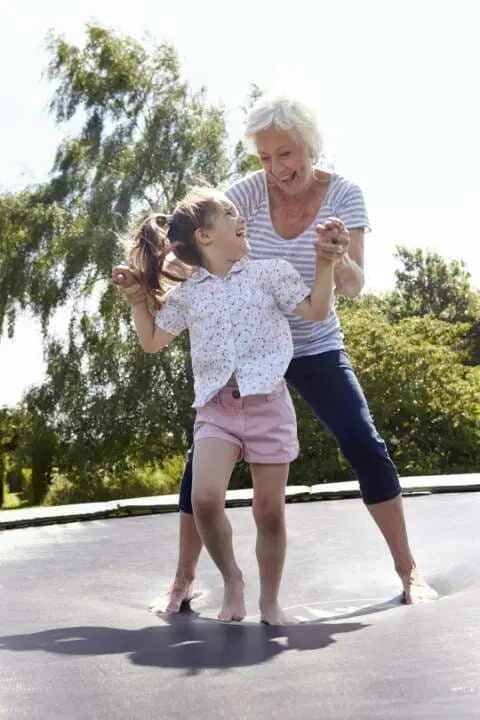Does Rebounding Make Your Face Sag?
If you’ve tried rebounding, you might be wondering, does rebounding make your face sag? After all, the repetitive up and down motion works against gravity, so does this affect your skin?
In this article, we’ll look at whether rebounding makes your face sag along with discussing its more general effects on your skin.
Does Rebounding Make Your Face Sag? Rebounding doesn’t make your face sag. While the anti-gravity nature of the exercise might seem like it’d cause your skin to droop, the opposite is actually true.
There are numerous reasons why rebounding helps with aging skin, which we’ll discuss below. If you’re looking for the best rebounders for seniors check out our comparison post.
Ready to start your rebounder weight loss journey? Try out our 8-week rebounder program!

Blood Circulation
The first thing worth mentioning is blood circulation. Poor circulation can lead to aged skin, as it needs blood to receive oxygen. Luckily, cardio exercise helps with blood circulation across your entire body, including the skin on your face.
Good circulation is also important for cellular repair. Healthy blood vessels and better circulation mean any damage to your skin (which makes it look older) will repair more quickly.
Collagen
If you’ve tried any anti-aging skin products, you probably already know what collagen is. In short, collagen is a protein in skin that gives it elasticity. As we age, our skin stops producing as much, which is why wrinkles happen. While you’ll never get back to youthful levels, exercising does help.
You can buy supplements like this:
The up and down movement of rebounding puts the collagen proteins under stress, but in a good way. It helps build their resistance, meaning they’re stronger – and your skin is, too.
Also, collagen levels are directly proportionate to cortisol levels, the hormone produce when we’re stressed. This point isn’t specifically related to rebounding but is true of all exercises. Working out reduces stress (and cortisol) levels, meaning your body will produce higher levels of collagen. So, not only will you feel better, but your skin will also be healthier.

Lymphatic System
Your lymphatic system is responsible for removing waste products and toxins from your body. Lymph nodes are what swell in your neck when you have a sore throat or cold. The lymphatic system is actually massive and stretches all over your body.
As part of its toxin removal system, it helps keep your skin looking fresh. After all, your skin is probably exposed to more toxins than a lot of other parts of your body, and is intimately connected to the removal process.
The up and down movement of rebounding is surprisingly good at stimulating your lymphatic system. Think of it like shaking a bottle to get the last bit of sauce out. While this is an incredibly simplified analogy, it’s not far off what happens here.
Is Rebounding Good for Your Face?
Rebounding is good for your face because of its effects on circulation and blood oxygen levels. This is true for any aerobic exercise, but rebounding stands out from the more common options. Compared to something like running, the low-impact nature of rebounding massively reduces the stress it puts on your body, meaning you can do more.
The reasons listed above are why rebounding is good for your face. Collagen production and improved circulation are both vital for youthful, healthy skin, reduction of under eye bags and their importance shouldn’t be overestimated. The more work you put in looking after your skin through exercise, the less you’ll have to do cosmetically.
But the last thing worth mentioning is the relationship between skin, rebounding and muscle growth. Rebounding helps you tone your muscles, as does any aerobic exercise. As your muscles tighten, so does your skin. Granted, rebounding doesn’t focus too heavily on your facial muscles, but areas such as your neck will be getting a workout as you bounce.
That said, the most important factor is easily the impact of rebounding on your circulation. It’s something that reduces quite significantly as we age, as almost anyone will tell you. While it’s more easily felt in extremities such as your hands and feet, it can also be evident in your skin.
Aerobic exercise causes your heart to work harder, meaning more blood and oxygen is pumped around your body. But the effects last after you’ve finished exercising because your heart becomes more efficient as it gets healthier. So, if you want to keep your skin looking healthy, make sure you start doing a low-impact workout like rebounding.
Is Rebounding Anti-Aging?
Rebounding is anti-aging in the sense that it keeps your body healthy, meaning the effects of aging aren’t as pronounced. You won’t necessarily reverse the signs of aging, as these are completely natural, but you can certainly delay them and make yourself look younger.
As mentioned, a lot of this happens in your circulatory system and, by extension, your skin. But there’s plenty going on beneath the surface that can be considered anti-aging. While skin is a focal point of many anti-aging campaigns, you must make sure you look after your insides, too.
Rebounding can help with everything from bone density and strength to tissue repair and digestion. As you age, your body has a harder time processing nutrients, meaning an effective digestive system is more important than ever. Similarly, you lose bone density, so finding a low-impact exercise that can improve it is vital.
Finally, rebounding helps support healthy brain function – both physically and mentally. It improves blood circulation to the brain, meaning it’ll physically work better. But, as with other exercises, it releases happy hormones, keeping your mood up, too. Considering age is as much a mental thing as a physical one, this is an important point worth mentioning.
Rebounding Facelift
Hopefully, you now have an answer to the question, does rebounding make your face sag? If it wasn’t obvious, it’s a resounding no. In fact, rebounding does a lot more good than harm when it comes to your skin, some might consider it a rebounding facelift!
If you’re aging and are looking for a way to keep yourself healthy, rebounding is a great option because of how little stress it puts on the body. Of course, if you’re unsure what to do, make sure you speak with a fitness professional first.
An ex-triathlete, fitness coach and writer with a Masters in Sports Physiology. Fitness is my passion and I've had my fair share of home fitness equipment tried and tested!



One Comment